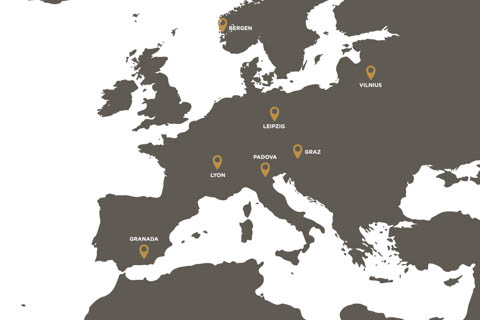 |
Faculty
Faculty of Physics |
|

|
Scope of studies and length
120 ECTS credits, 2 years |
|

|
Qualification awarded
Master in Engineering Sciences
|
|

|
Application deadline*
1 May / 1 July |
|

|
Language
English |
|

|
Tuition fee per year
6 100 € for non-EU students
5 538 € for EU students |
|

|
Start of studies
1 September
|
 |
City
Vilnius |
APPLY NOW
The aim of the programme is to train highly qualified, international standards meeting specialists who are able to understand, develop and integrate the latest technologies in the modern electronics and telecommunication industry, plan and organize their maintenance and renewal. The graduates will be capable to work in electronics and telecommunication companies as well as in scientific laboratories, implementing the latest scientific, technological and engineering achievements.
Programme structure
| Course unit title |
ECTS
credits
|
|---|
| Course unit title |
ECTS
credits
|
|---|
|
1 semester
Compulsory courses
Information elements and systems
Materials for information technologies
Radio interface in mobile communication systems
Digital signal processing and simulation
Elective courses
Modelling of the wireless channel
Applied terahertz physics
Digital optics
|
30.0
5.0
5.0
10.0
5.0
5.0
5.0
5.0
|
|
2 semester
Compulsory courses
Applications of distributed computing to telecommunication network modeling
Nanoelectronics
Microcontrollers in embedded systems
Optoelectronic devices in telecommunications
Scientific research work I/II
|
30.0
5.0
5.0
5.0
5.0
10.0
|
|
3 semester
Compulsory courses
Microwave electronics
Embedded linux systems
Applied electrodynamics
Scientific research work II/II
|
30.0
5.0
5.0
5.0
15.0
|
|
4 semester
Compulsory courses
Master thesis
|
30.0
30.0
|
Key Learning Outcomes
Graduates of the Master’s studies in Electronics and Telecommunication Technologies programme will be skilful in the following:
-
Knowledge and understanding of fundamentals, theory, and applications, analysis of complex processes and phenomena in the fields of electronics and telecommunication.
-
Working with new and complex electronic devices and telecommunication systems, specialised devices and technologies, such as ultra-high-frequency electronic devices.
-
Modelling the coverage of wireless networks, and calculation of the propagation properties of electromagnetic waves by statistical means such as big data analysis.
-
Developing and improving embedded microcontroller systems, and integrate them into the existing electronics infrastructure.
-
Understanding the main properties and principles of functioning of the new materials and sensors used in information technologies, as well as being able to apply them in modern technologies.
-
Planning their activities, to efficiently work in a team and independently.
Programme Specific Requirements
- Completed university bachelor’s degree studies in the physics field of the physical sciences study field group or the materials technology field of the technological sciences study field group or electronics engineering field of the engineering sciences study field group or other studies closely related to the aforementioned fields;
- In the diploma supplement: No less than 60 per cent of the volume of course units taken shall be in the fields of physics, mathematics, electronics, telecommunications, engineering, technological sciences; the cumulative grade point average of these course units shall be no less than 60 per cent of the maximum possible grade; all course units must be passed (positively assessed); additional points shall be awarded for scientific publications supported by bibliographic links and presentations in scientific conferences in the fields related with the study programme.
- The candidates meeting the aforementioned criteria are invited to the remote motivational interview. During the interview, the candidate’s determination to study in a master’s degree programme based on science is evaluated. If the interview is evaluated negatively, the candidate is not admitted to the study programme.
In addition, all applicants have to fulfil the general admission requirements.
Why Study at Vilnius University?
- Global outlook: 2000+ international students from 90 different countries.
- Ranked among the top 500 universities worldwide (QS).
- A European Union diploma.
|
What comes after?
- Pursue a career in industrial companies specialising in the development, implementation and administration of various electronic and telecommunication solutions and products, as well as government communications regulation authorities.
|


